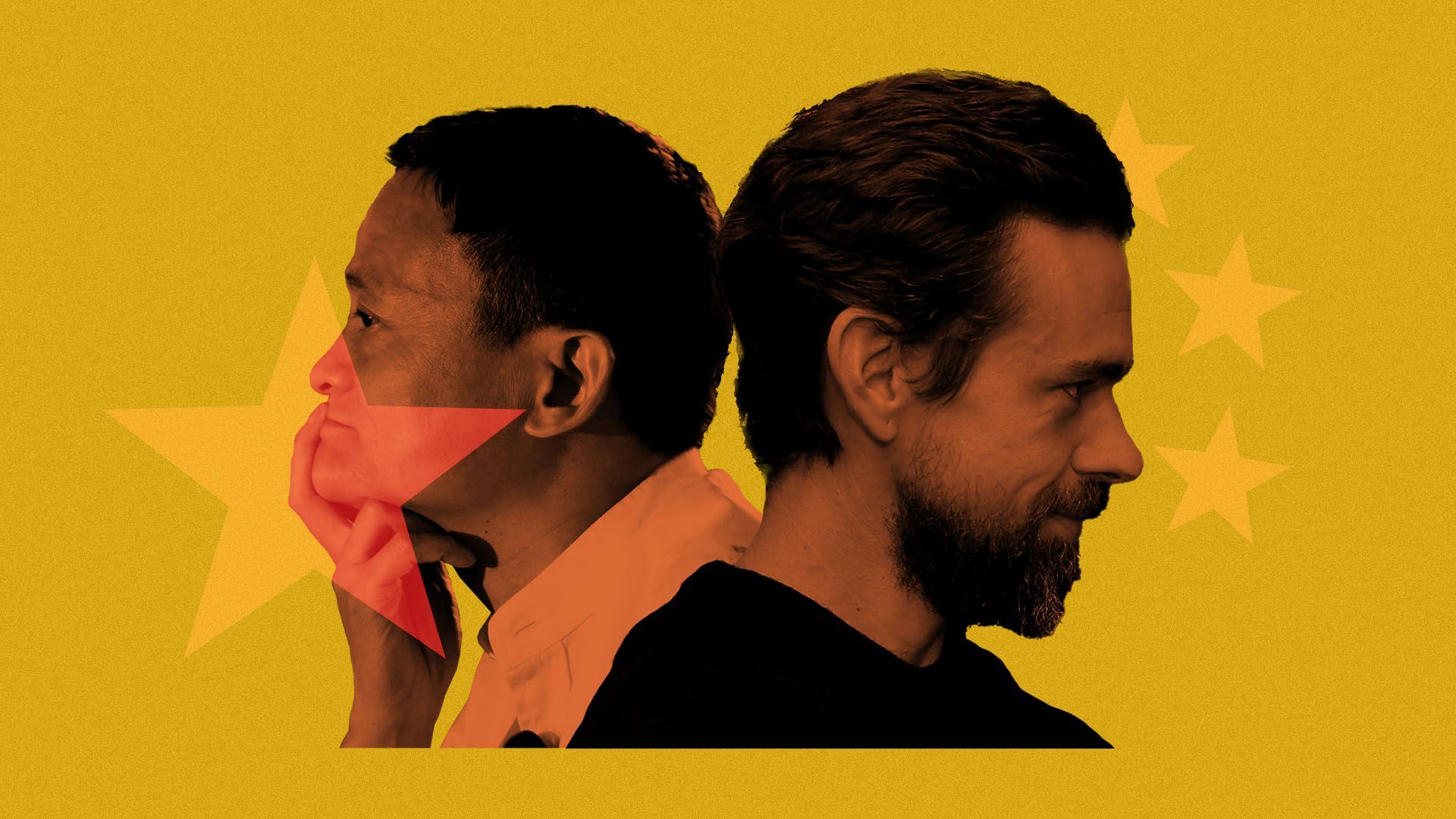A tale of two Jacks
Add Axios as your preferred source to
see more of our stories on Google.

Photo illustration: Sarah Grillo/Axios. Photos: Costfoto (Barcroft Media), Phillip Faraone/Getty Images
In China, President Xi Jinping has silenced Alibaba founder Jack Ma and launched an antitrust investigation into his company after the e-commerce tycoon publicly criticized state regulators. In the U.S., Twitter CEO Jack Dorsey has suspended President Donald Trump's accounts after the president used the platform to incite violence.
The big picture: The juxtaposition of two almost perfectly inverse situations reveals how differently China and the U.S. have approached the management of tech giants and digital information.
- The U.S. government has failed to address both the rise of private corporate power and the proliferation of online disinformation, leaving billionaire CEOs and their companies scrambling to find ad hoc solutions after the insurrection at the U.S. Capitol last week — and opening up tech companies to accusations of censorship.
- China is seeking to avoid the structural economic problems that monopolies have created in the U.S., while simultaneously looking to prevent companies from accruing enough power to challenge the Chinese Communist Party's decisions.
- Without meaningful civil rights protections, China sidestepped debate on online speech entirely by implementing extremely strict information controls and arresting people who don't comply, creating one of the world's most repressive polities.
What's happening: Ma, one of the world's richest men, hasn't made any public appearances in two months. Xi ordered regulators to halt the Alibaba-owned Ant Group's November IPO — expected to be the largest in history — shortly after Ma gave a speech criticizing Chinese banks and regulators for stifling innovation.
- Ma's speech angered top Chinese officials, bringing to a head years of concern that private Chinese companies were gaining so much power that they could challenge the Chinese Communist Party.
- In the subsequent two months, not only have Chinese government agencies launched an antitrust investigation into Alibaba, they've started a sweeping campaign to strengthen antitrust laws and are trying to ensure private companies obey the party's political directives.
In the U.S., another tech billionaire, Twitter CEO Jack Dorsey, has overseen the decision to permanently suspend the American president from his platform.
- Tech executives like Dorsey and Facebook's Mark Zuckerberg have repeatedly said they would prefer not to make these decisions on their own, calling on U.S. regulators to create regulation that would govern how they police free speech on their platforms.
- Still, Big Tech companies fear a full repeal of Section 230 —an internet regulation passed in 1996 that gives web publishers liability protection from content published on their sites by third parties — would fundamentally change the internet.
Context: In Europe, lawmakers have been more aggressive about checking corporate power by trying to pass regulation, and some officials there have expressed concern about U.S. social media bans on Trump.
- "The fact that a CEO can pull the plug on POTUS’s loudspeaker without any checks and balances is perplexing," Thierry Breton, the EU's digital commissioner, wrote in an article for Politico. "It is not only confirmation of the power of these platforms, but it also displays deep weaknesses in the way our society is organized in the digital space."
- German Chancellor Angela Merkel also described the ban as "problematic."
The bottom line: Social media bans on Trump appear superficially similar to China's rampant online censorship, but they are a symptom not of government overreach, but the opposite — the U.S. government's abrogation of its responsibility to address two of the thorniest issues of our day: the rise of online disinformation and unchecked corporate power.
